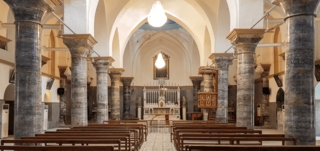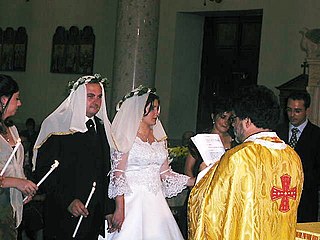Abouna may refer to:

The Coptic Orthodox Church, also known as the Coptic Orthodox Patriarchate of Alexandria, is an Oriental Orthodox Christian church based in Egypt, serving Africa and the Middle East. The head of the church and the See of Alexandria is the Pope of Alexandria on the Holy Apostolic See of Saint Mark, who also carries the title of Father of fathers, Shepherd of shepherds, Ecumenical Judge and the 13th among the Apostles. The See of Alexandria is titular. The Coptic Pope presides from Saint Mark's Coptic Orthodox Cathedral in the Abbassia District in Cairo. The church follows the Coptic Rite for its liturgy, prayer and devotional patrimony. Christians in Egypt total about four million people, and Coptic Christians make up Egypt’s largest and most significant minority population, and the largest population of Christians in the Middle East.
This is a directory of patriarchs, archbishops, and bishops across various Christian denominations. To find an individual who was a bishop, see the most relevant article linked below or Category:Bishops.
An apostolic see is an episcopal see whose foundation is attributed to one or more of the apostles of Jesus or to one of their close associates. In Catholicism the phrase, preceded by the definite article and usually capitalized, refers to the See of Rome.

The Chaldean Catholic Church is an Eastern Catholic particular church in full communion with the Holy See and the rest of the Catholic Church, and is headed by the Chaldean Patriarchate. Employing in its liturgy the East Syriac Rite in the Syriac dialect of the Aramaic language, it is part of Syriac Christianity. Headquartered in the Cathedral of Our Lady of Sorrows, Baghdad, Iraq, since 1950, it is headed by the Catholicos-Patriarch Louis Raphaël I Sako. In 2010, it had a membership of 490,371, of whom 310,235 (63.27%) lived in the Middle East.
A catholicos is the head of certain churches in some Eastern Christian traditions. The title implies autocephaly and, in some cases, it is the title of the head of an autonomous church. The word comes from ancient Greek καθολικός, derived from καθ' ὅλου from κατά and ὅλος, meaning "concerning the whole, universal, general"; it originally designated a financial or civil office in the Roman Empire.

Abuna is the honorific title used for any bishop of the Ethiopian Orthodox Tewahedo Church as well as of the Eritrean Orthodox Tewahedo Church. It was historically used solely for the head of the Coptic Orthodox Church in Ethiopia during the more than 1000 years when the Coptic Patriarchate of Alexandria appointed only one bishop at a time to serve its Ethiopian flock. When referred to without a name following, it is Abun, and if a name follows, it becomes Abuna.

Alphabetical list of Eastern Christianity-related articles on English Wikipedia
This is a directory of patriarchs across various Christian denominations.
This is a list of people named after Abraham, the Biblical patriarch ; the father of the Abrahamic religions: Judaism, Christianity and Islam.
Assyrian Americans refers to individuals of ethnic Assyrian ancestry born in or residing within the United States of America. Assyrians are an indigenous Middle-Eastern ethnic group native to Mesopotamia in West Asia who descend from their ancient counterparts, directly originating from the ancient indigenous Mesopotamians of Akkad and Sumer who first developed the independent civilisation in northern Mesopotamia that would become Assyria in 2600BCE. Modern Assyrians often culturally self-identify as Syriacs, Chaldeans, or Arameans for religious and tribal identification. The first significant wave of Assyrian immigration to the United States was due to the Sayfo genocide in the Assyrian homeland in 1914-1924.

The Monastery of Saint Macarius The Great also known as Dayr Aba Maqār is a Coptic Orthodox monastery located in Wadi El Natrun, Beheira Governorate, about 92 km (57 mi) north-west of Cairo, and off the highway between Cairo and Alexandria.
Iris Habib Elmasry was a prominent Coptic Historian (1910–1994).
Matta El Meskeen, born Youssef Iskandar, was a Coptic Orthodox monk. He was the key figure in the revival of Coptic monasticism, a movement which began in 1969 when he was appointed to the Monastery of St Macarius in the Wadi El Natrun in Egypt. By the time of his death the community had grown from 6 aged monks to 130 monks, and as many other monasteries were revived, new ones also began to open. He was twice nominated to become Coptic Pope, but was not chosen in either case.

Chaldean Catholics, also known as Chaldeans, Chaldo-Assyrians or Assyro-Chaldeans, are modern Assyrian adherents of the Chaldean Catholic Church, which originates from the historic Church of the East.

Assyrians in Lebanon are people of Assyrian descent living in Lebanon. It is estimated that there are approximately 30,000 Assyrians currently residing in Lebanon, primarily in Beirut and Zahlé. This number includes the descendants of Assyrian genocide survivors who fled Iraq, Turkey, and Iran between 1915-1934.

Christianity, which originated in the Middle East during the 1st century AD, is a significant minority religion within the region, characterized by the diversity of its beliefs and traditions, compared to Christianity in other parts of the Old World. Christians now make up approximately 5% of the Middle Eastern population, down from 20% in the early 20th century. Cyprus is the only Christian majority country in the Middle East, with Christians forming between 76% and 78% of the country's total population, most of them adhering to Eastern Orthodox Christianity. Lebanon has the second highest proportion of Christians in the Middle East, around 40%, predominantly Maronites. Egypt has the next largest proportion of Christians, at around 10% of its total population. Copts, numbering around 10 million, constitute the single largest Christian community in the Middle East.
Metropolitan Mikhail, was the Elder Metropolitan of the Holy Metropolis of Asyut (Lycopolis), (Hieracon, and of the Coptic Orthodox Church of Alexandria and was the Abbot of the Monastery of Saint Macarius the Great, in Scetes, Lower Egypt until early 2009, when he decided to resign this responsibility due to his failing health and also due to the demise of Matta El-Meskeen, the Chief Hegumen in-charge of the Monastery of Saint Macarius the Great in 2008.

The Catholic Church in the Middle East is under the spiritual leadership of the Pope in Rome. The Catholic Church is said to have traditionally originated in the Middle East in the 1st century AD, and was one of the major religions of the region from the 4th-century Byzantine reforms until the centuries following the Arab Islamic conquests of the 7th century AD. Ever since, its proportion has decreased until today's diaspora tendency, mainly due to persecution by Islamic majority societies. In most Islamic countries, the Catholic Church is severely restricted or outlawed. Significant exceptions include Israel and Lebanon.
Assyrian Church may refer to:

The Mystery of Crowning is a ritual component of the sacrament of marriage in Eastern Christianity. Variations of the crowning ceremony exist in multiple liturgical rites, including the Byzantine, Coptic, West Syriac, and East Syriac Rites of the Eastern Orthodox, Oriental Orthodox, and Eastern Catholic Churches. The crowning ceremony typically features a crown being placed upon the head of both the bride and bridegroom, crowning them as the queen and king of a new family.